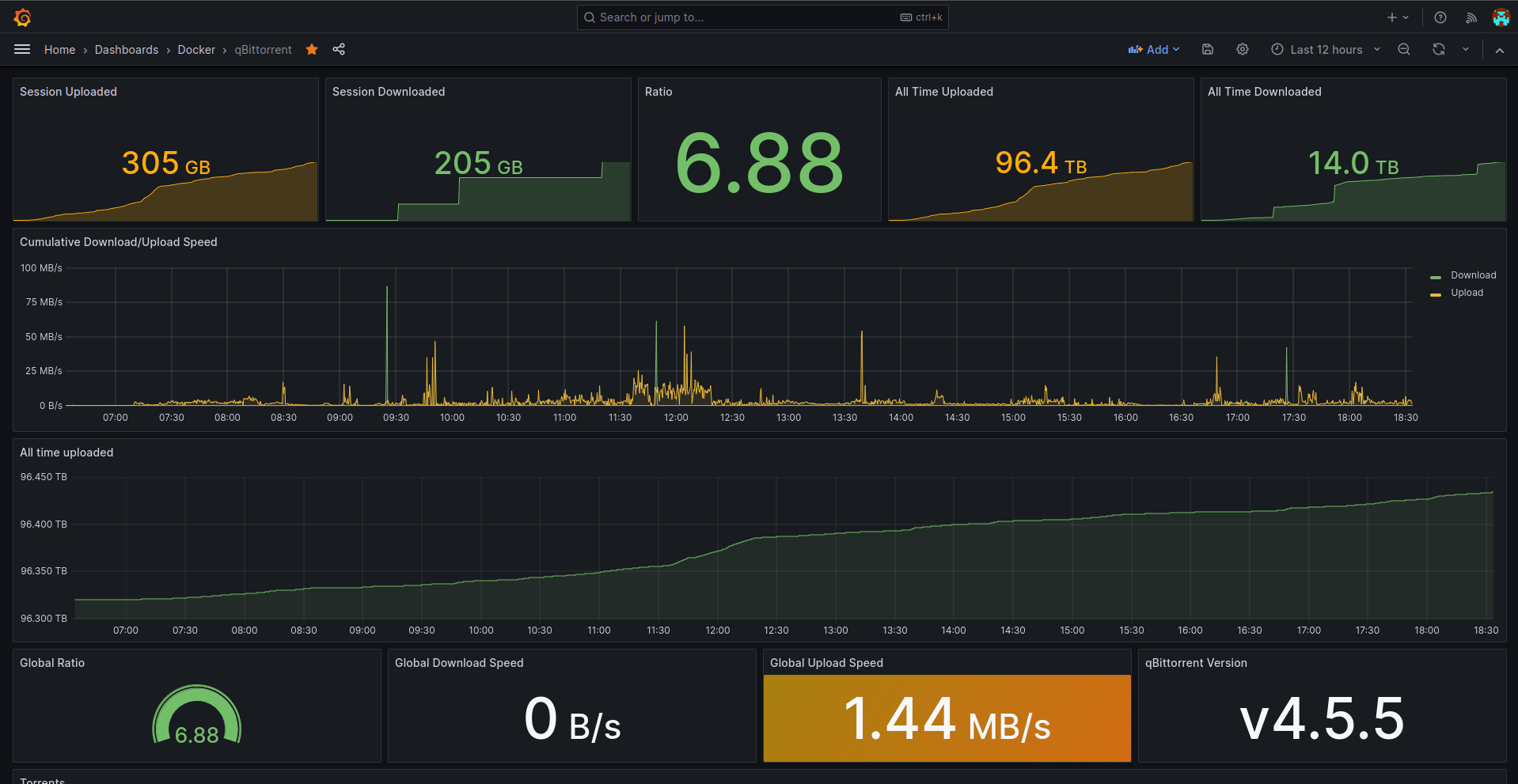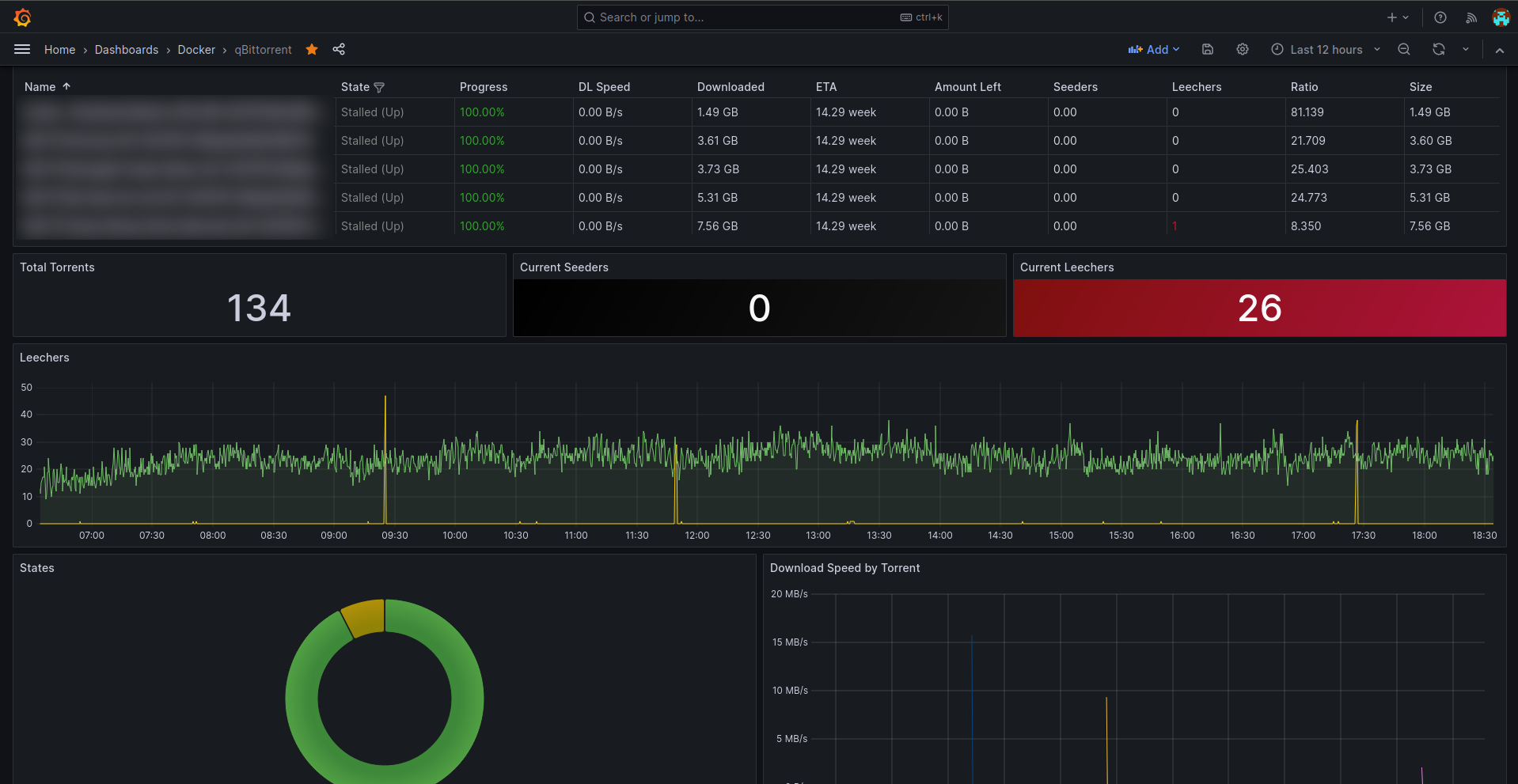This app is a Prometheus exporter for qBittorrent. You must have version 4.1.0 of qBittorrent or higher.
I was using an excellent exporter written in Java and I wanted to learn Go, that's how I got the idea to rewrite the exporter in Go.
Additionally, this project adds support for tags and categories. It tracks the categories and tags of each torrent and the global categories and tags.
This app is a lightweight and fast prometheus exporter for qBittorrent, made to be integrated with the qbittorrent-grafana-dashboard.
Docker-cli (click here for more info)
docker run --name=qbittorrent-exporter \
-e QBITTORRENT_BASE_URL=http://192.168.1.10:8080 \
-e QBITTORRENT_PASSWORD='<your_password>' \
-e QBITTORRENT_USERNAME=admin \
-p 8090:8090 \
ghcr.io/martabal/qbittorrent-exporter:latestversion: "2.1"
services:
qbittorrent-exporter:
image: ghcr.io/martabal/qbittorrent-exporter:latest
container_name: qbittorrent-exporter
environment:
- QBITTORRENT_BASE_URL=http://192.168.1.10:8080
- QBITTORRENT_PASSWORD='<your_password>'
- QBITTORRENT_USERNAME=admin
ports:
- 8090:8090
restart: unless-stoppedgit clone https://github.com/martabal/qbittorrent-exporter.git
cd qbittorrent-exporter
go get -d -v
cd src
go build -o ./qbittorrent-exporter
./qbittorrent-exporteror
git clone https://github.com/martabal/qbittorrent-exporter.git
cd qbittorrent-exporter
go get -d -v
cd src
go run ./srcIf you want to use an .env file, edit .env.example to match your setup, rename it .env then run it in the same directory. If you want to force to use the environment variables use -e argument like :
./qbittorrent-exporter -eor
go run ./src -eYou can find in the dashboard the following metrics:
- All time download/upload
- Session download/upload
- Cumulative upload/download speeds
- Global ratio/download speed/upload speed
- qBittorrent version
- Torrent list with statuses
- Total torrents/seeders/leechers
- Torrent state chart
- Amount remaining by torrent
- Incomplete torrent progress
- Download/upload speed by torrent
- Categories
- Tags
- Trackers
This app uses ~20 times less RAM compared to the original exporter for the same amount of torrents. Docker compressed size is ~10 MB.
| Parameters | Function | Default Value |
|---|---|---|
-p 8090 |
Webservice port | |
-e QBITTORRENT_USERNAME |
qBittorrent username | admin |
-e QBITTORRENT_PASSWORD |
qBittorrent password | adminadmin |
-e QBITTORRENT_BASE_URL |
qBittorrent base URL | http://localhost:8090 |
-e QBITTORRENT_TIMEOUT |
duration before ending a request to qBittorrent | 30 |
-e EXPORTER_PORT |
qbittorrent export port (optional) | 8090 |
-e LOG_LEVEL |
App log level (DEBUG, INFO, WARN and ERROR) |
INFO |
-e ENABLE_TRACKER |
get tracker infos, | true |
-e ENABLE_HIGH_CARDINALITY |
enable high cardinality metric (qbittorrent_torrent_info and qbittorrent_tracker_info) |
false |
-e ENABLE_LABEL_WITH_HASH |
[EXPERIMENTAL] add the torrent hash to the qbittorrent_torrent_* metrics label |
false |
-e EXPORTER_URL |
the URL shown in the logs when starting the exporter | `` |
-e EXPORTER_PATH |
the path where the metrics are exposed | /metrics |
-e DANGEROUS_SHOW_PASSWORD |
show the qBittorrent password in the logs when starting the exporter | false |
| Arguments | Function |
|---|---|
| -e | If qbittorrent-exporter detects a .env file in the same directory, the values in the .env will be used, -e forces the usage of environment variables |
Add the target to your scrape_configs in your prometheus.yml file of your Prometheus instance.
scrape_configs:
- job_name: "qbittorrent"
static_configs:
- targets: ["<your_ip_address>:8090"]



